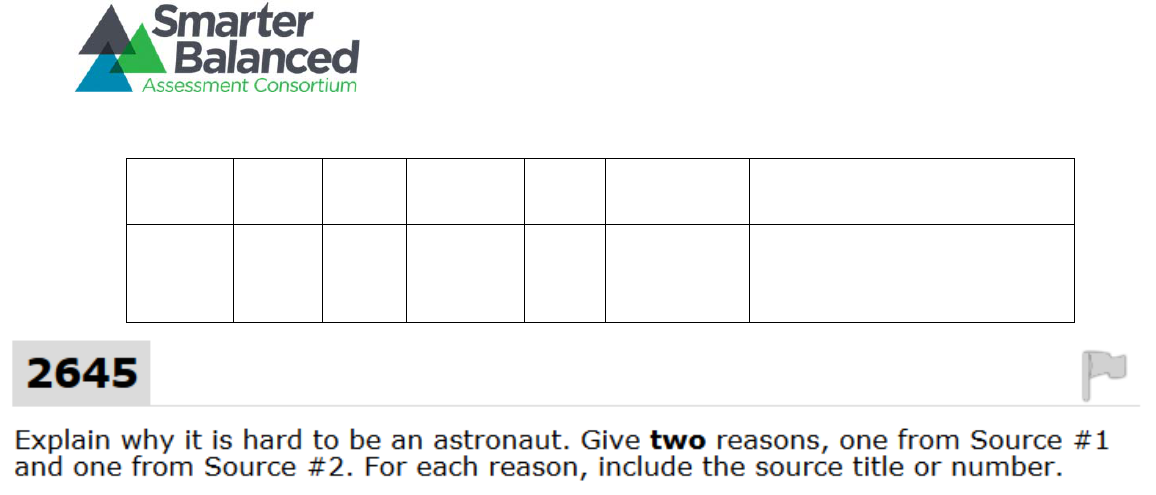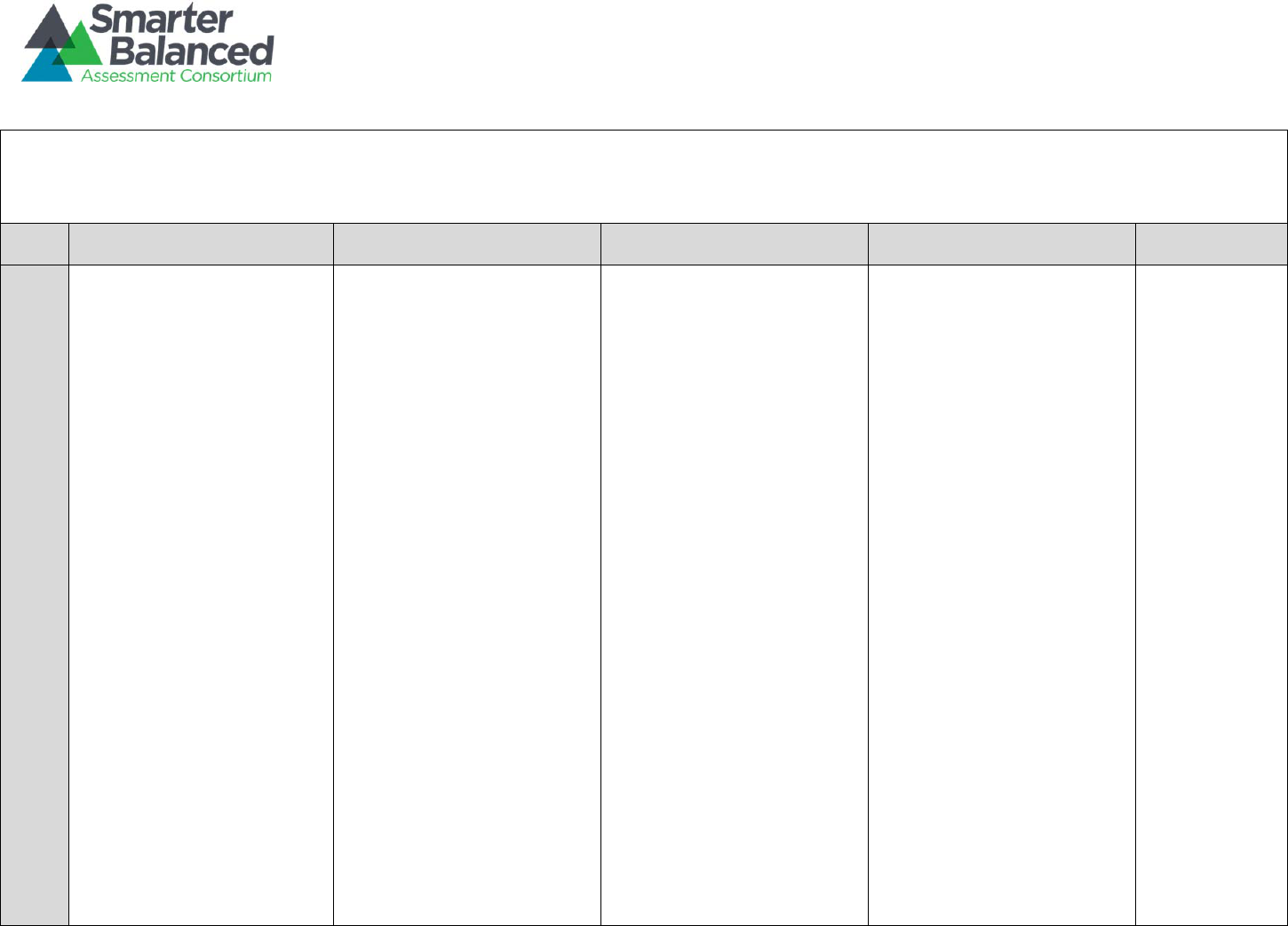
Smarter Balanced
Assessment Consortium:
English/Language Arts Practice Test Scoring
Guide
Grade 3 Performance Task
08/14/2019

Grade 3
2

Grade 3
3

Grade 3
4

Grade 3
5

Grade 3
6

Grade 3
7

Grade 3
8

Grade 3
9
Item # Grade Claim Target DOK
Item
Standard Evidence Statement
1 3 4 4 3 W-8
The student will select
evidence to support opinions
based on evidence collected.
Key Elements:
Astronauts feel weak when they come back from space: Source #2
Since objects are also able to float in space, astronauts can easily lift things
in space that are heavy: Source #1
Astronauts have a special view of Earth from space: Source #1
Rubric:
(1 point) 3 cells completed correctly.
(0 points) Fewer than 3 cells completed correctly or blank.

Grade 3
10
Item # Grade Claim Target DOK
Item
Standard Evidence Statement
2
3 4 4 3
W-1b
The student will select
evidence to support opinions
based on evidence collected.
Key Elements
:
Source #1 (What is an Astronaut?)
• A person who wants to be an astronaut has to study for years.
• There are many things an astronaut must learn to do before going into space
for the first time.
• Astronauts train for hundreds of hours.
• Being in space is work for astronauts.
• Astronauts must be healthy and eat right.
• They have to exercise and be in good shape.
• Astronauts have many adventures, but they work hard, too.
Source #2 (Life in Space)
•
They have many years of school and special training.
•
A lot of strange things happen to the body when it feels weightless and floa
ts
for that long.
• Astronauts sometimes feel sick in space.
• Being in space also changes how blood flows in the body.
• Their faces get puffy and their necks get bigger.
• At the same time, less blood flows to their legs, making them skinny. They
call this condition “bird legs.”
• The heart does not have to work as hard to pump blood in space. A muscle
that does not work hard gets weaker and smaller.
Continued on next page

Grade 3
11
• Astronauts’ other muscles and their bones can get weaker, too.
• Astronauts have to do exercises when they are in space.
• It takes time for them to get back their Earth legs and learn how to live with
gravity again.
Rubric:
(2 points) Response is an evidence-based explanation that provides two pieces of
evidence from different sources that support this claim and that explain how each
example supports the claim. Student cites the source for each example.
(1 point) Response is an evidence-based explanation that provides two pieces of
evidence from different sources that support this claim but doesn’t explain how
each example supports the claim. Student cites the sources.
OR
Response is an evidence-based explanation that provides two pieces of evidence
from a single source that supports this claim and that explains how that example
supports the claim. Student cites the source.
OR
Response is an evidence-based explanation that provides only one piece of
evidence from a single source that supports this claim and that explains how that
example supports the claim. Student cites the source.
OR
Response is an evidence-based explanation that provides two pieces of evidence
from different sources that support this claim and that explain how each example
supports the claim. Student does not cite sources.
(0 points) Response is an explanation that is incorrect, irrelevant, insufficient, or
blank.
Exemplar:
(2 points) It is hard to be an astronaut because living in space is difficult on an
astronaut’s body. Astronauts have to do many different things in order to keep
themselves healthy. Source #1 says that astronauts must be healthy and eat right.
This is important because if they do not stay healthy and eat right, they will not be
able to correctly do their job. They can do this by exercising and by being in good
shape. Source #2 says that being in space changes how blood flows in the body.
Astronauts' faces can get puffy and their necks can get bigger. This is hard on an
astronaut because it changes their body. Astronauts must do special exercises so
that their bodies do not become weak.
Continued on next page

Grade 3
12
(1 point) It is hard to be an astronaut because living in space is difficult on an
astronaut’s body. Astronauts have to do many different things in order to keep
themselves healthy. Source #1 says that astronauts must be healthy and eat right.
This is important because if they do not stay healthy and eat right, they will not be
able to correctly do their job. They can do this by exercising and by being in good
shape.
(0 points) It is hard to be an astronaut because they have to go to school for a long
time, and being weightless messes up their bodies.

Grade 3
13
Item
# Grade Claim Target DOK
Item
Standard Evidence Statement
3
3 2 4 4 W-2b
The student will write full informational texts on a
topic, attending to purpose and audience;
organize ideas by stating a focus (main idea);
include structures and appropriate transitional
strategies for coherence; include supporting
details (from sources when appropriate to the
assignment) and an appropriate conclusion.

Grade 3
14

Grade 3
15
4
‐
Point
In
f
o
rm
at
ional
PerformanceTaskWritingRubric(Grades
3
‐
5)
Score 4 3 2 1 NS
Organization/Purpose
Theresponsehasaclearand
effectiveorganizationalstructure,
creatingasenseofunityand
completeness.Theorganizationis
sustainedbetweenandwithin
paragraphs.Theresponseis
consistentlyandpurposefully
focused:
controlling/mainideaofatopic
isclearlycommunicated,and
thefocusisstrongly
maintainedforthepurpose
andaudi
ence
consistentuseofavarietyof
transitionalstrategiestoclarify
therelationshipsbetweenand
amongideas
effectiveintroductionand
conclusion
logicalprogressionofideasfrom
beginningtoend;strong
connectionsbetweenandamong
ideaswithsomesyntacticvariety
Theresponsehasanevident
organizationalstructurean
dasense
ofcomp leteness.Thoughtheremay
beminorflaws,theydonot
interferewiththeoverallcoherence.
Theorganizationisadequately
sustainedbetweenandwithin
paragraphs.Theresponseis
generallyfocused:
controlling/mainideaofatopic
isclear,andthefocusismostly
maintainedforthepu
rposeand
audience
adequateuseoftransitional
strategieswithsomevarietyto
clarifytherelationships
betweenandamongideas
adequateintroductionand
conclusion
adequateprogressionofideas
frombeginningtoend;
adequateconnectionsbetween
andamongideas
Theresponsehasaninconsistent
organizationalstructure.Someflaws
ar
eevident,andsomeideasmaybe
looselyconnected.Theorganizationis
somewhatsustainedbetweenand
withinparagraphs.Theresponsemay
haveaminordriftinfocus:
controlling/mainideaofatopic
maybesomewhatunclear,or
thefocusmaybeinsufficiently
sustainedforthepurpose
and/oraudience
in
consistentuseoftransitional
strategiesand/orlittlevariety
introductionorconclusion,if
present,maybeweak
unevenprogressionofideas
frombeginningtoend;and/or
formulaic;inconsistent or
unclearconnectionsbetween
andamongideas
Theresponsehaslittleorno
discernibleorganizationalstructure.
Theresponsemaybere
latedtothe
topicbutmayprovidelittleorno
focus:
controlling/mainideamaybe
confusingorambiguous;
responsemaybetoobrieforthe
focusmaydriftfromthe
purposeand/oraudience
fewornotransitional
strategiesareevident
introductionand/or
conclusionmaybemissing
frequentextraneousideasmay
beevident; ideasmay
berandomlyorderedorhavean
unclearprogression
Insufficient
(includes
copiedtext)
Inalanguage
otherthan
English
Off‐topic
Off‐purpose

Grade 3
16
4
‐
Point
In
f
o
rm
ational
PerformanceTaskWritingRubric(Grades
3
‐
5)
Score 4 3 2 1 NS
Evidence/Elaboration
Theresponseprovidesthorough
elaborationofthesupport/evidence
forthecontrolling/mainideathat
includestheeffectiveuseofsource
material.Theresponseclearlyand
effectivelydevelops ideas,using
preciselanguage:
comprehensiveevidence(facts
anddetails)fromthesource
materialisintegrated,
relevant,andspecific
clearcitationsorattributionto
sourc
ematerial
effectiveuseofavarietyof
elaborativetechniques*
vocabularyisclearlyappropriate
fortheaudienceandpurpose
effective,appropriatestyle
enhancescontent
Theresponseprovidesadequate
elaborationofthe
support/evidence
forthecontrolling/mainideathat
includestheuseofsourcematerial.
Ther
esponseadequatelyde velops
ideas,employingamixofpreciseand
moregenerallanguage:
adequateevidence(facts
anddetails)fromthe
sourcematerialis
integratedandrelevant,
yetmaybegeneral
adequateuseofcitations
orattributiontosource
material
adequateuseofsome
elaborativetechniques*
vocabularyisgenerally
appropriatefortheaudienceand
purpose
generallyappropriatestyleis
evident
Theresponseprovidesuneven,
cursoryelaborationofthe
support/evidenceforthe
controlling/mainideathatincludes
unevenorlimiteduseofsource
material.Theresponsedevelops
ideasunevenly,usingsimplistic
language:
someevidence(factsand
details)fro
mthesource
materialmaybeweakly
integrated,imprecise,
repetitive,vague,and/orcopied
weakuseofcitationsor
attributiontosource
material
weakorunevenuseof
elaborativetechniques*;
developmentmayconsist
primarilyofsource
summary
vocabularyuseisunevenor
somewhatineffectiveforth
e
audienceandpurpose
inconsistentorweakattemptto
createappropriatestyle
Theresponseprovidesminimal
elaborationofthesupport/evidence
forthecontrolling/mainideathat
includeslittleornouseofsource
material.Theresponseisvague,lacks
clarity,orisconfusing:
evidence(factsanddetails)from
theso
urcematerialisminimal,
irrelevant,absent,incorrectly
used,orpredominantlycopied
insufficientuseofcitationsor
attributiontosourcematerial
minimal,ifany,useof
elaborativetechniques*
vocabularyislimitedor
ineffectivefortheaudience
andpurpose
littleornoevidenceof
ap
propriatestyle
Insufficient
(includes
copiedtext)
Inalanguage
otherthan
English
Off‐topic
Off‐purpose
*Elaborativetechniquesmayincludetheuseofpersonalexperiencesthatsupportthecontrolling/mainidea

Grade 3
17
2
‐
Point
In
f
o
rm
ational
PerformanceTaskWritingRubric(Grades
3
–
5)
Score 2 1
0
NS
Conventions
Theresponsedemonstratesanadequate
commandofconventions:
adequateuseofcorrectsentence
formation,punctuation,capitalization,
grammarusage,andspelling
Theresponsedemonstratesapartialcommand
ofconventions:
limiteduseofcorrectsentenceformation,
punctuation,capitalization,grammarusage,
andspelling
Theresponsedemonstrateslittleorno
commandofconventions:
infrequentuseofcorrectsentence
formation,punctuation,capitalization,
grammarusage,andspelling
Insufficient
(includes
copiedtext)
Inalanguage
otherthan
English
Off‐topic
Off‐purpose
HolisticScori
ng:
Variety:Arangeoferrorsincludessentenceformation,punctuation,capitalization,grammarusage,andspelling.
Severity:Basicerrorsaremoreheavilyweightedthanhigher‐levelerrors.
Density:Theproportionoferrorstotheamountofwritingdonewell.Thisincludestheratiooferrorstothele
ngthofthepiece.
